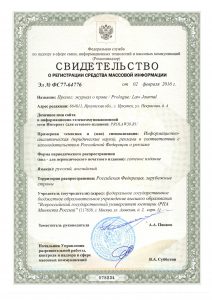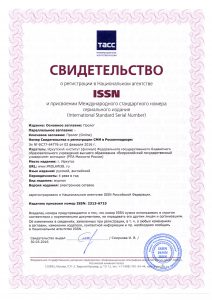Meaning of the concept “first offender” is not likely significant for an ordinary citizen: this is any man who has committed any kind of crime for the first time, and it doesn’t matter whether he is punished or not. A person more qualified in the law, presumably, adds to this definition a note about the necessity for an offender to be of a legal age that allows considering an offence as criminal and a man as a person to have committed this offence. Furthermore, it does not matter whether the crime is committed intentionally or recklessly and whether it can be admitted as non-criminal due to unimportance (p. 2, art. 14 of the Russian Criminal Code[1]). In fact, the nearest equivalent to the concept of offender has been formulated in the sphere of criminology where, from the legal point of view, a criminal act is associated with a person committed a crime.
The concept “first offender” has more serious exceptions and conventionalities in criminal justice; these exceptions and conventionalities have occurred not in criminal law, but in the practical application. In the process of law enforcement, the issue under consideration induces the greatest number of disputes grouped into two main approaches. The first approach is presented clearly in the concept of “first offender” introduced in p.2 of the Resolution of the Plenum of the Supreme Court of the Russian Federation No.19 of June 27, 2013[2]. Neither the fact of the commission of the crime nor amount of crimes committed by the same person are under discussion, but the presence or absence of possibility of criminal prosecution in case of one or more crimes. Due to the second approach the concept “first offender” is a special kind of reaction to the first one that means returning to traditional definition of the concept “first offender” as a person who has committed a crime for the first time in his life [1; 2]. We need to pay attention to the fact that in recent times the number of supporters of the second approach increases not thanks to theoreticians, but practicians of criminal law. Due to this tendency some opinions such as “the Law provides for commission of certain offences repeatedly and with impunit [2]” have probably occurred. It would better to say that discussed situation is a consequence of law executor’s (Supreme Court of the Russian Federation) point of view to the Law interpretation; it made one of the legislative concepts different from its traditional meaning.
Therefore, the topicality of the discussion above is to identify the following: a part of what kind of the Criminal Law Institution the concept “first offender” is used in and what meaning it has. With the absence of legislative definition of the first offender in law enforcement level just one Criminal Law Institution – relief from criminal liability – applies different attempts to underline the meaning of the concept in the valid period of the Russian Criminal Code 1996. Such phenomenon takes place in the sphere of standards application in this Institution provided for both by the Common part of the Russian Criminal Code (p. 1 Art. 75, p. 1,2 Art. 76.1, Art. 76.2) and by the Special part of the Russian Criminal Code (app. to Art. 127.1, 198, 199, 205.5, 208, 282.1-282.3, 337, 338). Meanwhile the concept “first offender” has criminal value in other Institutions of the Criminal Law: compulsory labour – Art. 53.1 of the Russian Criminal Code, imprisonment – Art. 56, p. 6 Art. 88 of the Russian Criminal Code, circumstances mitigating punishment – Art. 61 of the Russian Criminal Code, relief from punishment – Art. 80.1 of the Russian Criminal Code.
Therefore, nowadays the concept “first offender” not being underlined in the Criminal Law impacts on practical application of all the Institutions of the Criminal Law concerned with criminal liability and punishment. To understand legislator’s conceptual position to this issue we observe the history of the Russian Criminal Legislation.
It is important to emphasize that with the introduction of the concept “first offender” to the Criminal Legislation the aim of such step has not been mentioned. In accordance with different periods of the Russian Criminal Legislation such aim is seemed to be consisted in the differentiation of criminal liability for a person who has committed a crime for the first time and for a person who has previously committed any kind of crime. For example, especially such meaning was used in the Guiding Principles of the Criminal Law of the RSFSR 1919 (further the Guiding Principles) declaring that “In determining the measures of punishment in each instance it is necessary to distinguish… whether the act was committed by a professional criminal (recidivist) or by a first offender (Art.12)[3]. The fact of crime committing for the first time is summarized in the same meaning in the Art.25 of the Criminal Code of the RSFSR, 1922[4]. Criminal acts outline clearly the result of criminal liability differentiation on the issue under consideration: commission of the crime for the first time not even in itself but along with other conditions could lead to the application of a conditional sentence (Art.26 of the Guiding Principles, Art.36 of the Criminal Code of the RSFSR, 1922). In the meantime, we can conclude from the text of the Guiding Principles and the Criminal Code of the RSFSR, 1922 that the Russian Criminal Legislation of that period explained the concept “first offender” differently from the traditional way of its understanding. On the one hand, the word “first” was connected not with any kind of crime, but just with a crime that “permitted the Court to determine punishment of remand in custody”. Moreover the reason of probation revocation and its substitution by the conviction did not involve any kind of repeated commission of the crime, but just “identical or appropriate to the crime” (Art. 26). On the other hand, the word “first” was also connected not with any kind of crime, but just with the crime whereunder “the Court enforces the imprisonment” (Art. 36). The analysis of the Guiding Principles and the Criminal Code of RSFSR, 1922 allows to conclude the following: definite commission of the crime for the first time in set with other circumstances could have preferential criminal value when committing a crime with the high level of public danger (custody, imprisonment)[5]. In other words, the circumstance we are interested in was basic for differentiation of criminal liability due not to pettiness of crime, but to serious one.
The Fundamental Principles of the Criminal Legislation of the USSR, 1924 outlined criminal value of the criminal background for the first time concisely enough and definitely: “More lenient social protection is distinguished by the Court in case when a crime was committed … for the first time” (p. “c” Art. 32)[6].
The Regulations of Military Offences of October 31, 1924[7] is the great example explaining criminal value of multiplicity of crimes, even if there is just one type:
“6. The first escape: a) leads to the commission into penal unit for a term to 3 months as a means of social protection with the availability of mitigating circumstances or little political consciousness; b) the imprisonment for a term to 1 year is enforced in the absence of mitigating circumstances.
7. The second escape leads to the secure confinement for a term to 2 years as a means of social protection.
Escape committed more than twice leads to the secure confinement for a term of 3 years as a means of social protection. In this case the Court has to determine the way of serving military official’s time in army”.
The decision of the issue under consideration took place in the Criminal Code of the RSFSR, 1926[8] where commission of the crime for the first time was considered as mitigating circumstance “determining one or another measure of social protection” (Art. 48), but “a crime committed by a person who has previously committed any kind of crime” is considered as aggravating circumstance even if there are some exceptions (Art. 47). Peculiarity of such Legislation involves the following: in determining criminal value of the multiplicity of crimes in mitigating aspect the legislator of that period of time was based on factual meaning of the concept “first offender”, and according to the aggravating aspect the legislator was based on a legal interpretation of this concept. It meant that commission of the crime by a person who has previously committed crimes was not underlined as aggravate circumstance in case when “the particular person was deemed to be non-convicted (Art. 55), or in case when time-limits have expired since the day of commission of the first crime” (Art. 14, Art. 15)[9]. Here we have a unique legal definition of the concept “first offender” that was legitimate till the Criminal Code of the RSFSR 1960[10] came into legal force. Nevertheless, the Fundamental Principles of the USSR 1958[11] did not have such definition, commission of the crime by a person who has previously committed crimes kept the meaning of circumstance aggravating responsibilities (the Court had the right not to admit it) (p. 1, Art. 34). The Fundamental Principles did not also have a note about commission of the crime for the first time as a circumstance mitigating responsibilities (Art. 33).
Anyway, the Criminal Code of the RSFSR 1926 introduced multiplicity of crimes in two different aspects: as mitigating circumstance and aggravating circumstance. The Criminal Code of the RSFSR 1960 involved the same definition. However, in comparison with the previous standard regulations the definition of multiplicity of crimes in the mitigating aspect was transformed from “commission of the crime for the first time” into “first commission of the crime”. According to p. 4 Art. 38 of the Criminal Code of the RSFSR 1960 a circumstance migrating criminal responsibility was identified as “the first commission of the crime as a consequence of circumstances in case if this commission does not represent a significant public danger”.
The Criminal Code of the RSFSR of 1960 is also remarkable: the first commission of the crime involved additional meaning to the Institution of Imposition of Sanctions. If criminal value of the first criminal background became legally invalid in the Criminal Code of the RSFSR 1926, then it was reformed inside of the Institution of Exemption from Criminal Responsibility. According to the Art. 51 of this Criminal Code the person could relieved from criminal responsibility with the reference to the community court in case if “he has committed any kind of crime for the first time”. We need to pay attention to the fact that the crimes must be underlined in parts 1-3 of this Article.
The fact of the first commission of the crime was prescribed in the Fundamental Principles of the Criminal Legislation of the USSR 1991[12] (further – the Fundamental Principles) as well, where it was accepted differently from previous decisions of the issue under consideration in the Criminal Legislation. Neither the Institution of Imposition of Sanctions nor the Institution of Exemption from Criminal Liability paid attention to the fact of the first commission of the crime. Prescribing of the first criminal background in the Fundamental Principles was ascribed by referenced character of standards covered by p. 1 Art. 42 and p. 1 Art. 48 of the Fundamental Principles. According to the Fundamental Principles a list of circumstances, mitigating or aggravating responsibilities, grounds and procedure of exemption from criminal responsibility and punishment must be prescribed in the Criminal Codes of Union Republics. In the meantime, it was surprisingly found that the federal legislator attached importance to the first criminal background inside of the Institution of The Criminal Responsibility of Juveniles. According to the p. 3 Art. 60 of the Fundamental Principles a person in the age under 16 who has committed a crime for the first time without a significant public danger was not liable to criminal proceedings. Moreover the Fundamental Principles provided for this right when a person in the age under 18 who has committed a crime for the first time without a significant public danger was not liable to imprisonment (p. 3 Art. 68 of the Fundamental Principles). However, these circumstances of the commission of the crime for the first time were not fully prescribed in the Criminal Codes of Union Republics of the USSR. Talking about the Criminal Code of the RF 1996, we can mention that the first edition of the Code provided the circumstance under consideration with criminal value just in case of exemption from criminal responsibility to juveniles. It depended on enforcer’s opinion: “A juvenile who has committed a crime of small or average gravity for the first time may be relieved from criminal responsibility if it is found that his reformation can be achieved by applying compulsory measures of educational influence” (p. 1 Art. 90 of the Criminal Code of the RF).
Nevertheless, the Criminal Code of the RF 1996 provided fully and thorough national legislator’s selectivity to the criminal value of the commission of the crime for the first time, especially in recent years. However, one aspect here must be considered.
The first edition of the Criminal Code of the RF 1996 includes another attempt to describe a legal notion of “commission of the crime for the first time”. It was also undertaken in the Fundamental Principles of 1991 when regulating one form of multiplicity of crimes. But from our point of view, it was less effective. Despite of the concept “frequency of crimes” the Art. 16 of the Criminal Code of the RF involved the concept “repeatedness of crimes”. In accordance with this fact p. 2 of the Art. 16 sets up the following rule: “A crime shall not be deemed to be committed repeatedly if the person has been excused from criminal responsibility in the statutory manner for the crime committed earlier, or if the record of conviction for the crime committed earlier has been exponged or annulled”. In comparison with p. 2 Art. 21 of the Fundamental Principles 1991, the Criminal Code did not have a reference to relief from punishment that led a person to be deemed to be non-convicted. P. 2 Art. 86 of the Criminal Code of the RF involves the same rule. This rule keeps its meaning nowadays. Both the Fundamental Principles 1991 and the Criminal Code of the RF 1996 did not respond to the question: does legislative definition of repeated or single crime (multiplied or the first) have cross-cutting criminal value, or does it work just inside of the Institution of Multiplicity of Crimes? Not having given a response to this question, a legislator excluded Art. 16 in the Criminal Code of the RF in 2003. Moreover the legislator excluded not perfect, but a unique definition of the concept “commission of the crime for the first time”[13].
From historical point of view, the analysis of the fact of the first commission of the crime in the Criminal Legislation allows making a conclusion assisting the improvement of criminal policy in this sphere.
- In the list of circumstances that influence on the character and level of criminal responsibility for a crime committed by a person the concept “commission of the crime for the first time” has not been prescribed in the Criminal Legislation initially. Despite of the fact that Russian Criminal Legislation always aimed to regulate circumstances mitigating or aggravating responsibility for a commission during the Court proceedings (later – during the trial stages), the number of committed crimes (multiplicity of crimes) has been prescribed there just in soviet period. It’s enough to say that a broader range of circumstances, “aggravating or mitigating guilt and penalty” provided for by the 1845 Code of Criminal and Correctional Punishment (Art. 135-140) did not involve the information about multiplicity of crimes. The Russian penal code of 1903 had nothing about multiplicity of crimes in spite of its progressive and all-inclusive character. Due to this fact the concept of “first offender” and the concept of “old offender” were equal in the Criminal Legislation of that period of time.
- When the fact of commission of the crime for the first time was prescribed in the Criminal Legislation it assumed preferential criminal value. In addition to that the federal legislator’s aim to distinguish criminal responsibility for the first offenders and persons who has previously committed any kind of crime (the Guiding Principles of the Criminal Law of the RSFSR, 1919) was transformed lately into the following: the differentiation of criminal responsibility for the first offenders in the legal sense and for persons who has previously committed any kind of crime in the legal sense, too. Till the moment when the Criminal Code of the RSFSR, 1960 came into legal force, the legal sense of the concept “first offender” was different from the actual definition of the concept, but it was based on the content of the Criminal Legislation. The further usage of the concept “first offender” is realized (earlier and nowadays) without any contradictions in its meanings in the Criminal Legislation. The Criminal Law does not determine the concept “first offender”, and the Case Law explains it from the legal point of view, different from the actual definition of the concept “first offender”.
- Initially the fact of the commission of the crime was basic for differentiation of criminal responsibility without regard to the character of the crime and its level for public danger. In modern language it can be named as without “linking” to the particular categories of crime. In other words, it worked not with grave offences or offences with minor gravity, but “inside” of criminal responsibility for grave offences.
- All the qualified normative standards of the criminal character that were legal till the Criminal Code of the RF 1996 came into legal force, the legislator argued about “a person who has committed a crime for the first time”, emphasizing the fact of the commission of the crime but not a person who has committed a crime. The Criminal Code of the RF 1996 excluded these concepts and introduced the concept “first offender”.












